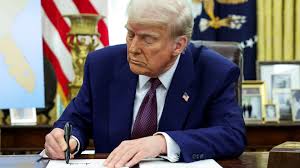President Donald Trump has sparked renewed debate with a striking proposal: a $2,000 payment to nearly every American, funded by tariffs on foreign imports.
While the idea of instant cash appeals to many, experts and lawmakers are questioning both its legal feasibility and practical implementation. As details remain sparse, Americans are left wondering if the money would actually materialize.
Through a series of posts on Truth Social, Trump laid out his vision of using tariffs not only to protect U.S. industries but also to create a nationwide dividend. “A dividend of at least $2,000 per person (excluding high-income individuals) will be paid to everyone,” he declared.
The plan’s premise is simple: levy tariffs on imported goods, generate revenue, and redistribute a portion directly to American citizens. Trump framed the proposal as a continuation of his economic strategy, which he claims has strengthened the U.S. economy.

“People who oppose tariffs are FOOLS! We are now the richest, most respected country in the world, with almost no inflation and record stock market highs. 401(k)s are highest EVER,” Trump wrote, highlighting his view that tariff revenue bolsters financial stability.
He also emphasized the potential benefits of reinvesting tariff revenue domestically: “We are taking in trillions of dollars and will soon begin paying down our enormous $37 trillion debt. Record investment in the USA—plants and factories are going up all over the place.”
Despite these claims, experts caution that the actual logistics of distributing a $2,000 payout to millions of Americans remain uncertain, and the legality of funding such a program solely through tariffs has yet to be evaluated.
Conclusion
Trump’s proposal blends economic policy with political theater, drawing attention with the promise of quick cash. While tariffs could theoretically generate revenue, the practicality of delivering such a broad payout—and the legal hurdles involved—remain unclear.
As the conversation unfolds, Americans are left to weigh the appeal of immediate financial relief against the complexities of law and economics.
